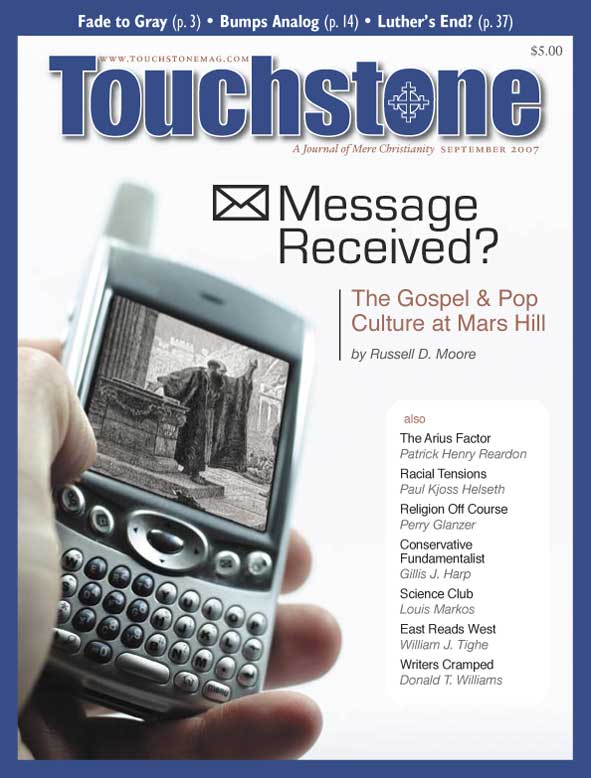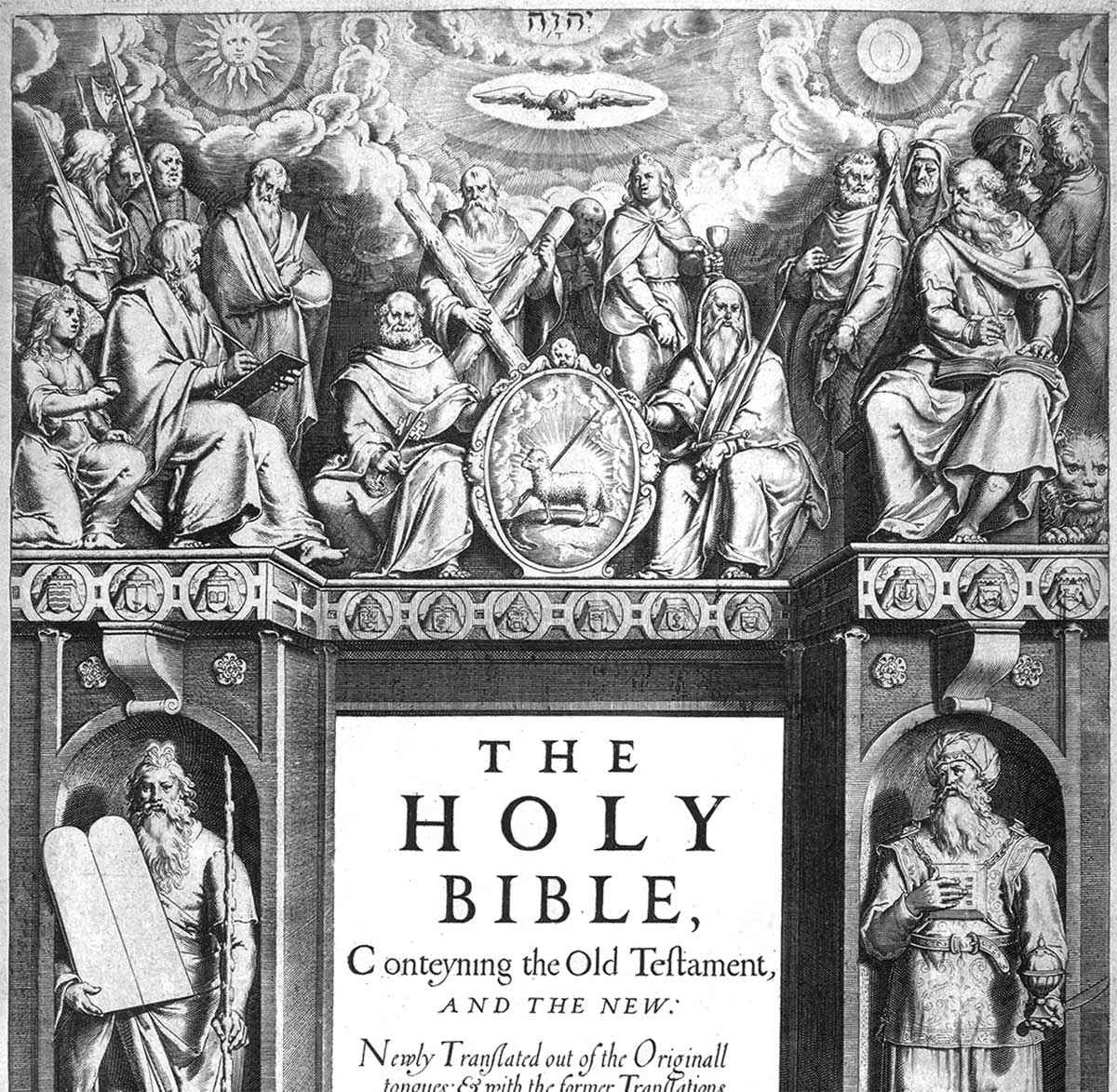Writers Cramped
Donald T. Williams on Three Things Evangelical Authors Can Learn from Flannery O’Connor
My fellow Evangelicals publish reams upon reams of prose. What we have not tended to write is anything recognized as having literary value by the literary world. What makes this failure remarkable is that our Protestant forebears include a number of people who did: Philip Sidney, Edmund Spenser, George Herbert, John Milton, and John Bunyan, to mention a few.
Equally remarkable is the host of near contemporary conservative Christians—sometimes quite evangelical and even evangelistic, though not “Evangelicals”—who were also important writers. G. K. Chesterton, C. S. Lewis, J. R. R. Tolkien, T. S. Eliot, Graham Greene, Aleksander Solzhenitsyn, Walker Percy, and Flannery O’Connor are all recognized as important literary figures even by people who do not share their Christian commitment.
Where is the contemporary American Evangelical who can make such a claim?
No Ranking Names
The modern Christians who are important writers are all from liturgical churches: Catholic, Anglican, Orthodox. The closest thing Evangelicalism has to a name that could rank with these is probably Walter Wangerin, Jr., who is not really a mainstream Evangelical but a Lutheran—again, from a liturgical tradition.
Try to think of a conservative Baptist, a Free or Wesleyan Methodist or a Nazarene, a conservative Presbyterian, a Plymouth Brother, a member of the Evangelical Free Church or the Christian and Missionary Alliance, a Pentecostal, or a member of an independent Bible church who belongs in that company. (Some have mentioned writers who used to be in those churches—but the phrase “used to” in the observation is telling.)
The liturgical churches foster a lot of schlock and kitsch of their own, but they also nurture great writers and great writing. So far, we Evangelicals have not. In fact, we often positively discourage “literary” writing as being of questionable spiritual value.
I define an Evangelical as a person committed to Nicene and Chalcedonian orthodoxy, a high view of the authority of Scripture, the Reformation doctrine of justification by faith alone, and the necessity of personal faith in Christ (and therefore the importance for most people of a personal conversion experience, as long as we do not stereotype it) for salvation.
If committed Evangelicals must give up any of that in order to nurture serious artists and writers, then we are prepared to let art and literature perish from the earth! But I cannot believe that the God who begot the incarnate Logos desires any such thing.
So let us find another way, and ask, “What can we learn from these great Christian writers—and their church traditions—that Evangelicals can apply in their own discipling communities?” Evangelicals could—and should—learn the same lessons from their Protestant forebears, especially from Philip Sidney, whose luminous The Defence of Poesy could be the foundation for a healthier Protestant poetics.
But there is also something healthy about listening to our contemporaries in the faith. So let me attempt a beginning by examining one useful recent example.
The Hillbilly Thomist
Flannery O’Connor, the Georgia writer who died of disseminated lupus in 1964, was a self-styled “hillbilly Thomist” whose novels Wise Blood and The Violent Bear It Away and collections of short stories A Good Man Is Hard to Find and Everything That Rises Must Converge have transcended the local-color cubbyhole into which they were first placed to shock, puzzle, intrigue, and delight a growing body of readers ever since.
A devout and loyal Catholic who often had more sympathy with Protestant Fundamentalists than with others in her own tradition, she wrote in Mystery and Manners (her collected essays, from which all the quotes in this essay are taken) that
I am no disbeliever in spiritual purpose and no vague believer. I see from the standpoint of Christian orthodoxy. This means that for me the meaning of life is centered in our Redemption by Christ and what I see in the world I see in its relation to that.
In most of her stories the central character starts off smugly self-sufficient but is given an opportunity to receive the grace of God, to which he usually does not respond very well. A master of irony, O’Connor often puts the most profound spiritual insight into the mouth of the character who is by conventional standards farthest from the Kingdom.
There are no cheap conversions. Yet the cumulative effect of her stories is to break down the modern sense of enlightened self-sufficiency and prepare readers to accept their own need for grace.
Although she often expressed a bemused impatience with the expectations of the average Catholic reader, O’Connor also found in the larger tradition of that church a community that nurtured and supported her artistic vision. She mentions at least three forms of such nurture she found there, only one of which is likely to be present in the typical Evangelical congregation.
A True Worldview
First, O’Connor found a true worldview, encapsulated in dogma, which constituted a lens that brings human nature and human significance into piercing clarity. “Dogma,” she said, “is an instrument for penetratingreality. . . . It is one of the functions of the Church to transmit the prophetic vision that is good for all time, and when the novelist has this as a part of his own vision, he has a powerful extension of sight.”
O’Connor understood that good writers do not simply parrot these insights; they must take this doctrinal understanding and apply it to the concrete realities of human life. “Your beliefs will be the light by which you see, but they will not be what you see and they will not be a substitute for seeing.”
When we do not understand this distinction, Christian fiction becomes mere religious propaganda. “The sorry religious novel comes about when the writer supposes that because of his belief, he is somehow dispensed from the obligation to penetrate concrete reality.” Doctrine is a light to see human experience by, not a formula to be dressed up in a fictional disguise.
Though O’Connor did not put it this way, the biblical worldview gives us several truths relevant to the writer of fiction or poetry. It teaches us that everything in creation is significant, pregnant with meaning, because it all came from and relates back to the eternal Logos. It teaches us to see life as a drama of redemption in which human choices matter, and to see all of life, not just religious conversion, in those terms.
And it teaches us the value not only of God’s creation but also of our own creativity, for we were made in the image of the Creator. As J. R. R. Tolkien put it in his seminal essay “On Faerie Stories,” “We make still by the law in which we’re made.”
Some Evangelical congregations still do a good job of transmitting the biblical worldview and the specifics of Christian doctrine. But we have not done so well at giving Evangelicals the confidence to take this body of doctrine and use it creatively as a tool to understand life and experience.
Purposeful Art
The second form of nurture O’Connor felt she had received from the Catholic Church was a definition of art that affirmed a spiritual purpose, indeed, a vocation, for the artist distinct from that of the propagandist. She quotes Thomas Aquinas as saying that art “is wholly concerned with the good of that which is made.” And she adds,
We are not content to stay within our limitations and make something that is simply a good in and by itself. Now we want to make something that will have some utilitarian value. Yet what is good in itself glorifies God because it reflects God.
This is a telling comment. That which reflects God may have an evangelistic effect. But if evangelism must be the primary purpose of everything we write, then a lot of God’s character will remain unreflected—which will,ironically, not help the cause of evangelism. Also, the emphasis on “the good of that which is made” puts theology on record as affirming the value—indeed, the necessity—of the hard work and craftsmanship required for good writing.
I have searched the current popular Evangelical systematic theologies—Wayne Grudem’s, Millard Erickson’s, and so on—in vain for a definition of art. For us, it does not seem to be a theological topos.
O’Connor complained that too many Catholic writers were too utilitarian in their approach, but at least their theologians thought art a topic worthy of attention. Indeed, Catholic theologian Hans Urs von Balthasar made it the organizing principle of his systematics, with series entitled The Glory of the Lord: A Theological Aesthetics and Theo-Drama.
So it is not surprising that, with no such emphasis coming from its leaders, the popular Evangelical subculture seems even more addicted to pragmatism in itsapproach, as a brief trip through the “Christian bookstore” will show. Fiction can only be justified if it has an overt evangelistic purpose; works of visual art must have a Scripture verse tacked under them.
Perhaps when our theologians become concerned with the good of the thing made, some of our people will, too.
Fictional Mystery
The third form of nourishment O’Connor acknowledged as a gift from the Catholic Church was a sense of mystery. Good fiction ultimately probes the mysteries of life: Why are we here? Why do we suffer? What is the Good?
“It is the business of fiction to embody mystery through manners,” she wrote. Therefore, “the type of mind that can understand good fiction is . . . the kind of mind that is willing to have its sense of mystery deepened by contact with reality, and its sense of reality deepened by contact with mystery.”
In Catholic worship with its sacramental focus, O’Connor found her sense of mystery nourished, and saw such nourishment as a key to the writer’s ability to “penetrate concrete reality”: “The more sacramental his theology, the more encouragement he will get from it to do just that.”
Does their theology of the sacraments preclude Evangelicals from nurturing their writers in this way? Not necessarily. Metaphor and symbolism are central to the creative process for writers, and they are an important way in which we evoke and assimilate mystery.
One need not believe in transubstantiation to make the Lord’s Supper more central in worship, nor does a symbolic or metaphorical view of the sacrament render it irrelevant to the lives of artists. But Evangelicals have too quickly and too often reacted to what they perceive as the abuses of the biblical sacrament in the Mass by relegating the Eucharist to a marginal role in their worship.
This cannot be unrelated to the fact that we as a community can seem too much like the generation O’Connor described, “that has been made to feel that the aim of learning is to eliminate mystery.” Our services, like our fiction, are justified by their efficiency in achieving pragmatic goals. Our sermons are full of practical, easy steps to spiritual victory, a better marriage, or financial success; our music is designed to express comfortable emotions; everything is aimed at maximizing the body count at the altar call.
Some of these goals are worth pursuing, but perhaps if abasement before a transcendent deity, felt as such, were one of them, we would produce better Christians and better writers.
The Evangelical Lack
It is not the distinctive emphases of Evangelical theology, but rather a lack of other emphases, equally biblical, that has kept us from being a community good at nurturing the arts.
Our failure to encourage our people to apply doctrine to the realities of life; our failure to include in our theology the whole counsel of the God who called Bezalel and Oholiab and gifted them as artists; and our pragmatism, an uncritical reflection of American culture rather than a biblical mandate, with our mystery-impoverished worship tradition are all simple failures to be what we claim to be, faithful to Scripture. They could be changed without threatening any of the doctrinal emphases that we think we have been right about.
Donald T. Williams is Professor Emeritus of Toccoa Falls College. He stays permanently camped out on the borders between serious scholarship and pastoral ministry, between theology and literature, and between Narnia and Middle-Earth. He is the author of fourteen books, including Answers from Aslan: The Enduring Apologetics of C. S. Lewis (DeWard, 2023). He is a contributing editor of Touchstone.
subscription options
Order
Print/Online Subscription

Get six issues (one year) of Touchstone PLUS full online access including pdf downloads for only $39.95. That's only $3.34 per month!
Order
Online Only
Subscription

Get a one-year full-access subscription to the Touchstone online archives for only $19.95. That's only $1.66 per month!
bulk subscriptions
Order Touchstone subscriptions in bulk and save $10 per sub! Each subscription includes 6 issues of Touchstone plus full online access to touchstonemag.com—including archives, videos, and pdf downloads of recent issues for only $29.95 each! Great for churches or study groups.
Transactions will be processed on a secure server.
more from the online archives
calling all readers
Please Donate
"There are magazines worth reading but few worth saving . . . Touchstone is just such a magazine."
—Alice von Hildebrand
"Here we do not concede one square millimeter of territory to falsehood, folly, contemporary sentimentality, or fashion. We speak the truth, and let God be our judge. . . . Touchstone is the one committedly Christian conservative journal."
—Anthony Esolen, Touchstone senior editor









